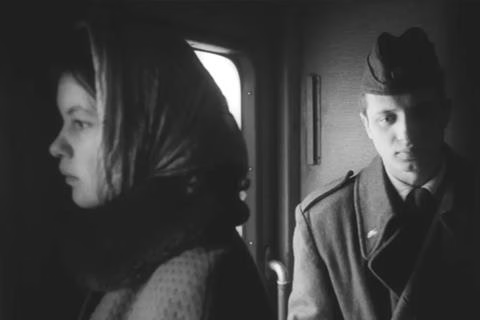Found-footage documentary Trains, directed by veteran Polish auteur Maciej J. Drygas, has won the best film award of the international competitio
Found-footage documentary Trains, directed by veteran Polish auteur Maciej J. Drygas, has won the best film award of the international competition at the International Documentary Festival Amsterdam (IDFA). It comes with the €15,000 cash prize.
Trains is an archive-based film made without voiceover or commentary other than an opening quote from Franz Kafka. It comprises footage of trains sourced from a reported 45 archives across the world. Much of the imagery is disturbing – wounded and deformed soldiers, dead bodies from concentration camps, Nazi officers on their way to war zones. There is also material of Hitler and Charlie Chaplin.
Drygas’s partner Vita Żelakeviciute produced the film which was made through family company, Drygas Film Production. A sales agent is yet to be appointed.
“This is a bold and inventive use of archive,” said the jury. “The film shows us routes to the positive and negative consequences of modern industrial innovation. It harnesses the magic of cinema and as an audience we are haunted by our present historical time, even while we bear witness to the past.”
Trains also won the IDFA award for best editing.
French director Auberi Edler won the €5,000 best director award in the International Competition for An American Pastoral. Sold by Mediawan and produced by Serge Lalou for Les Films d’Ici Méditerranée, the verité-style observational documentary is set in Elizabethtown in Pennsylvania where the local community is divided over everything from religion to gun law and what books the school library should be allowed to lend to kids.
“By simply looking and listening, this director reveals the current complexity at the heart of the United States,” said the jury. “Her deep commitment to observation allows the viewer to come face to face with the communities in the film and provides critical insight into the results of the last US presidential election,” the jury stated.
Best cinematography in the international competition went to Zvika Gregory Portnoy and Zuzanna Solakiewicz for The Guest, a Poland-Qatar co-production. The documentary follows Alhyder, a youthful Syrian refugee hiding out in the forbidden “zone,” border area between Belarus and Poland. The film is produced by Plesnar & Krauss Films and co-directed by Michał Bielawski.
The international competition jury was comprised of Juliana Fanjul, Sophie Fiennes, Grace Lee, Asmae El Moudir, and Kazuhiro Soda.
Envision competition
Cuban filmmaker Miguel Coyula won the €15,000 best film prize in the Envision competition for Chronicles Of The Absurd (Cuba). This has a €15,000 cash prize. The €5,000 best director award went to Massimo D’Anolfi and Martina Parenti for Bestiaries, Herbaria, Lapidaries, an Italy-Switzerland collaboration.
The award for outstanding artistic contribution went to Lebanon’s Omar Mismar for A Frown Gone Mad and to Taiwan’s Yo-Hen So for Park.
Dutch director Lisa Schamlé won the €5,000 IDFA DocLab award for immersive non-fiction for Me, A Depiction (Netherlands).
Entropic Fields of Displacement from Pegah Tabassinejad won the €5,000 IDFA DocLab award for digital storytelling.
Theo Panagopoulos’s UK film The Flowers Stand Silently, Witnessing was awarded the €5,000 best miniature doc prize.
Among the other awards, the Fipresic award was presented to Najiba Noori’s Writing Hawa, a France-Netherlands-Qatar-Afghanistan co-production.
Luuk Bouwman’s The Propagandist won the €5,000 best Dutch film prize.

COMMENTS